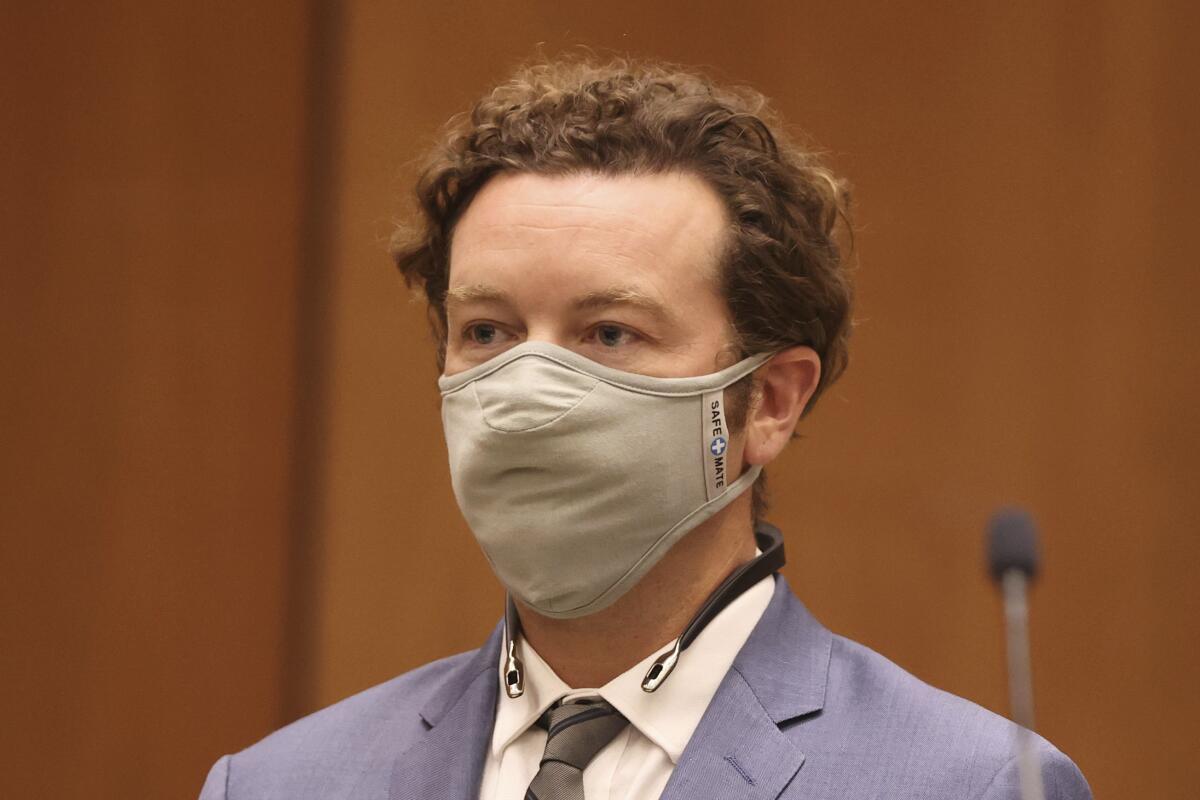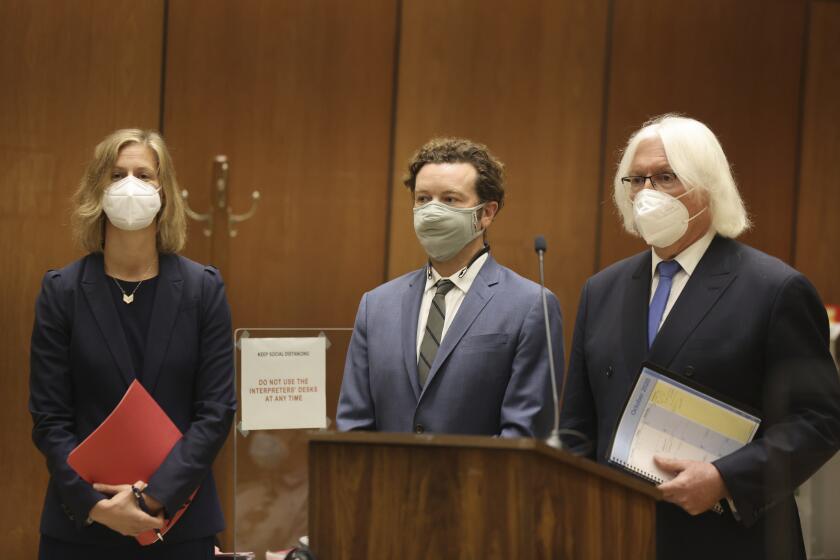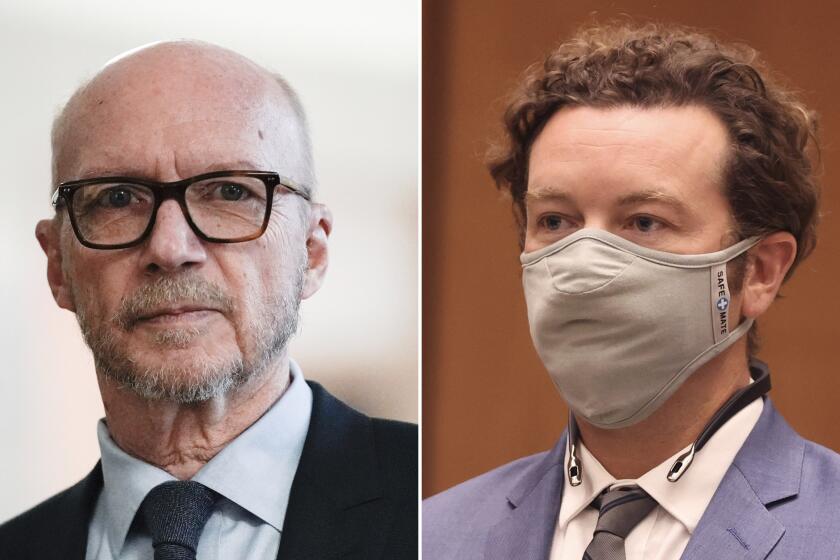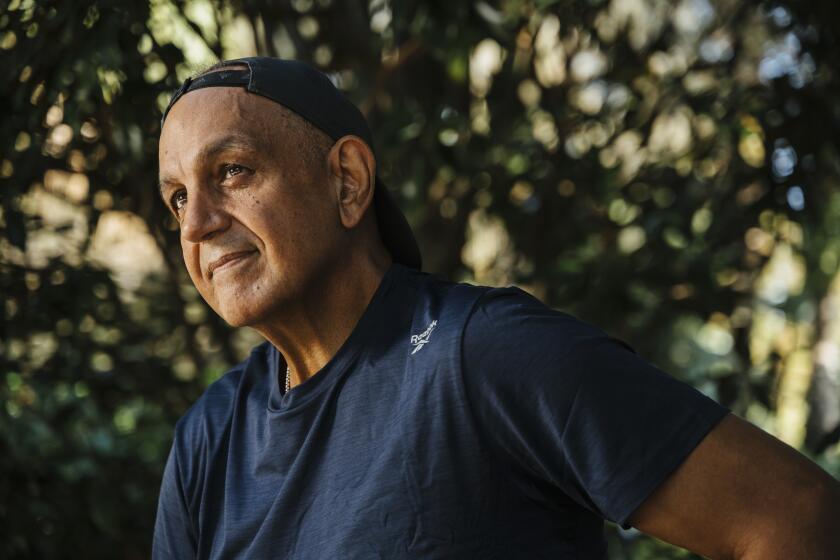Mistrial in Danny Masterson rape trial after jury deadlocks

- Share via
Danny Masterson’s rape trial ended Wednesday in a mistrial after jurors said they were unable to reach a decision on the actor’s innocence or guilt.
The Los Angeles jury deadlocked after hearing weeks of testimony, including from the three women who accused Masterson of raping them . In failing to reach a decision, the panel left unresolved the women’s claims that the actor, who is best known for his role on the sitcom “That ‘70s Show,” violently assaulted them at his Hollywood Hills home in the early 2000s.
The divisions among jurors were apparent in the final votes they took before telling Los Angeles County Superior Court Judge Charlaine Olmedo they would not be able convict or acquit. On one of the rape charges, only two of the 12 jurors wanted to find Masterson guilty, while four were in favor of a guilty verdict on the second rape charge and five voted to convict on the third.
It was not immediately clear whether the L.A. County district attorney’s office plans to retry Masterson on the charges. Olmedo spoke privately with prosecutors and Masterson’s defense team after declaring the mistrial and then announced a new trial would start March 27.
But later Deputy Dist. Atty. Ariel Anson would not confirm the decision to retry Masterson, saying, “It’s a conversation we have to have with our office.”
Masterson’s attorney, Phillip Cohen, said afterward that he would move to have the charges dismissed, saying the jury’s leanings toward acquittal “speaks volumes.”
“There was a lot of information that came out. There were a lot of pieces of testimony to follow,” he said. “I think this case has significant issues and I think the jury saw those issues.”
Masterson didn’t respond to questions as he left the downtown courthouse with his wife, actress Bijou Phillips. Navigating through a throng of reporters, the couple and supporters walked into traffic on Broadway on their way to their car. Drivers honked and cursed at the group to get out of the way.
Like Masterson, the three women were members of the Church of Scientology at the time of the alleged attacks, and prosecutors in the trial delved into the faith’s arcane rules for its followers. Two of the women testified that they had delayed reporting Masterson, fearing that church officials would sanction them for doing so.
‘That ’70s Show’ actor Danny Masterson, a Scientologist, is charged with raping three former Scientologists who say the church tried to silence them.
In recounting the alleged attacks during the trial, the women told jurors that Masterson had plied them with alcohol before assaulting them in the bathroom and bedroom of his home.
The Times generally does not name victims of sexual assault unless they choose to fully identify themselves. To protect their privacy, the three women accusing Masterson were identified in court either by their first name and last initial or first initial and last name.
“He is very charming in front of people,” testified Christina B., who was Masterson’ girlfriend for six years.
But the charm could morph into violent rage when they were alone with him, the women said.
Jen B. and a third accuser, N. Trout, said Masterson had forced them into his backyard hot tub despite their pleas that he stop. Jen B. said he‘d displayed a gun during the assault and choked her into unconsciousness.
“I thought I was going to die,” she testified in October.
“What are you doing? ... You can’t do that,” Trout recounted saying to Masterson at the time. “Why did you do that? I told you no.”
Christina B., who had dated Masterson in the late 1990s and early 2000s, testified that the actor was often violent with her during their relationship, and accused him of raping her as she slept in November 2001. She said that she awoke and begged him to stop, and then pulled Masterson’s hair in an attempt to make him relent. In response, he slapped her in the face and spat on her, she testified.
“We are obviously disappointed that, at least for the time being, Daniel Masterson has evaded criminal accountability for his deplorable acts,” two of the accusers said in a joint statement. The statement was also attributed to the husband of one of the women and another accuser who is part of a civil case against Masterson.
Jurors had wrestled with the evidence for 2½ days before telling the judge they were deadlocked on the Friday before Thanksgiving.
Olmedo instructed the jurors to keep deliberating but gave them a week off for the holiday.
When jurors returned Monday, two tested positive for the coronavirus. They were replaced with two alternate jurors and deliberations started from scratch. The additions of the alternates did not break the impasse, and jurors again told Olmedo on Wednesday that a unanimous vote for guilt or acquittal was not possible.
The trials of ‘That ‘70s Show’ actor Danny Masterson and ‘Crash’ director Paul Haggis on either coast have moved Scientology into the spotlight.
The allegations against Masterson played out against the backdrop of Scientology, and the trial provided a glimpse into the secretive world of the church’s Celebrity Centre International in Hollywood, where prosecutors and accusers said the church worked to protect the actor from the allegations.
All three of Masterson’s accusers have since left the church.
Jen B. and Christina B. testified they were afraid that if they reported Masterson to law enforcement they would be labeled “suppressive” by the church. That would have required their families and friends in Scientology to cease contact with them, they said.
“I was a Scientologist and Mr. Masterson is a Scientologist, and you cannot report another Scientologist in good standing to the authorities,” Jen B. testified. “My life would be over. My parents would have to disconnect from me. … I couldn’t talk to any of my friends ever again. … I wouldn’t have anywhere to work or live.”
Christina B. testified that her “ethics officers” in Scientology told her that you cannot be raped by your significant other — or “second dynamic,” as partners are known in the church.
The Church of Scientology denies protecting Masterson or dissuading any of the accusers from going to law enforcement with their allegations of rape. The church also says it never declared any of the women suppressive.
Women who accused actor Danny Masterson of rape testified that they waited to report him because they feared being excommunicated, like his stepfather was.
“The Church does not discourage anyone from reporting any alleged crime nor tell anyone not to report any alleged criminal conduct. The Church has no policy prohibiting or discouraging members from reporting criminal conduct of Scientologists, or of anyone, to law enforcement,” spokeswoman Karin Pouw said in a statement. “Quite the opposite, Church policy explicitly demands Scientologists abide by all laws of the land.”
The Masterson trial coincided with another high-profile rape case: former Hollywood producer Harvey Weinstein’s trial, taking place down the hall on the ninth floor of the same downtown L.A. courthouse.
It also coincided with the civil trial in New York of Oscar-winning director Paul Haggis, a former Scientologist, who was accused of raping a woman in 2013. Haggis speculated the rape allegations were a plot advanced by Scientology. A jury this month found Haggis liable for sexual assault and ordered him to pay his accuser $10 million.
The Masterson and Haggis trials left the church embroiled in sex scandals on either side of the country.
Olmedo limited testimony about the religion in Masterson’s trial.
She allowed the women to explain how their involvement in Scientology led them to delay reporting their accusations against Masterson to police. Olmedo also said they could tell jurors about their belief that church policy prohibits reporting crimes committed by other Scientologists to law enforcement.
Cohen, the defense attorney, argued that Scientology was the “elephant in the room.”
“We’ve heard Scientology over and over again. … It really became the go-to excuse. When someone didn’t remember something or something got contradicted, it became about Scientology,” he said in closing arguments.
Cohen worked to convince jurors that the women’s stories did not line up and that they had banded together to create false accusations against his client.
The prosecutors’ case, he said, “ignored the blatant, obvious, overwhelming contradictions and fabrications that each Jane Doe has given you.”
More to Read
Sign up for Essential California
The most important California stories and recommendations in your inbox every morning.
You may occasionally receive promotional content from the Los Angeles Times.















